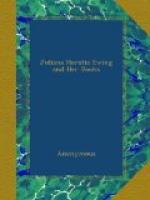[Grenoside.] February 21, 1880.
* * * * *
I whiled away my morning in bed to-day by going through the Lay of the Last Minstrel. There are lovely bits in it.
Reading away at Mrs. Browning lately has very much confirmed my notion that the fault of her things is lack of condensation. They are almost without exception too long. I doubt if one should ever leave less than fifty per cent. of a situation to one’s readers’ own imagination, if one aims at the highest class of readers. That swan song to Camoeens from his dying lady would have been very perfect in FIVE verses. As it is, one gets tired even of the exquisite refrain “Sweetest eyes, were ever seen” (an expression he had used about her eyes in a song, and which haunts her).
The other night we had Sergeant Dickinson up. He has lately settled in the village. He was in the Light Cavalry Charge at Balaklava (17th Lancers), and also at Alma, Inkerman, and Sebastopol. He has also the Mutiny Medal and Good Conduct and Service one, so he is a good specimen. Curious luck, he never had a scratch (!). Says he has had far “worse wounds” performing in Gyms., as he was a good swordsman, etc. He told us some dear tales of old Sir Colin Campbell. He said his men idolized him, but their wives rather more so, and if any of them failed to send home remittances, the spouses wrote straight off to Sir Colin, who had up “Sandy or Wully” for remonstrance, and stopped his grog “till I hear again from your wife, man.”
On one occasion he saw a drummer-boy drunk, and a sergeant near. Sir Colin: “Sergeant, does yon boy belong to your company?”
Sergeant: “He does not, sir.”
“Does he draw a rum allowance?”
“He does, sir.”
“Well, away to the Captain of his company, and say it’s my orders that the oldest soldier in this bairn’s company is to draw his rum, till he feels convinced it’s for the lad’s benefit that he should tak it himsel’—and that’ll not be just yet awhile I’m thinking.”
Some brilliant tales too of the wit and gallantry of Irish comrades, several of whom wore the kilt. And almost neatest of all, a story of coming across a fellow-villager among the Highlanders:
“But I were fair poozled He came from t’ same place as me, and a clever Yorkshireman too, and he were talking as Scotch as any of ’em. So I says, ’Why I’m beat! what are YOU talking Scotch for, and you a Knaresborough man?’ ‘Whisht! whisht! Dickinson,’ he says, ‘we mun A’ be Scotch in a Scotch regiment—or there’s no living.’"...




